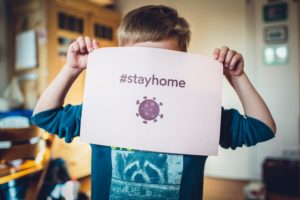It’s time to create a Summer of COVID-19 plan for your child or teen. Consider holding your own “home camp.”
by Carey A. Heller, PsyD
 Our fears of how the coronavirus pandemic will impact summer plans for our children and teenagers have become a reality. Many summer camps are cancelled and some will offer only virtual options. Daycare centers in some regions remain shuttered. While some parents are expected to continue working remotely, others need to return to in-person work soon or at some point in the near future.
Our fears of how the coronavirus pandemic will impact summer plans for our children and teenagers have become a reality. Many summer camps are cancelled and some will offer only virtual options. Daycare centers in some regions remain shuttered. While some parents are expected to continue working remotely, others need to return to in-person work soon or at some point in the near future.
Unfortunately, the current situation leaves many people even more anxious about navigating the summer months with kids. This is especially true for those who had set plans and now must regroup. For parents of children and teens with ADHD—who often need significant structure—the reality of at least three more months at home without in-person external structure may be terrifying, to say the least.
Nevertheless, I urge parents to work on making the most of this time and to avoid focusing on this experience as solely a negative thing. View it as the opportunity to help your child or teen have more say in developing their interests, improving various skills (such as executive functioning or academic skills), and setting themselves up for more success in the future (however you wish to define that). It is also an opportunity to enhance parent-child relations and your own parenting skills.
 It would be best to make a solid, structured plan for your children or teens for this summer. First, consider the following questions:
It would be best to make a solid, structured plan for your children or teens for this summer. First, consider the following questions:
- What hours do you need to be able to work?
- For how long can your children and/or teens be independent, without adult supervision?
- Do you have relatives or friends who could assist if needed (even remotely if it’s not safe to meet in person)?
- Would you want to try to organize your own makeshift virtual camp with your child’s friends and have parents take turns running a video activity each day?
- Are there specific skills that you would like your child or teen to improve over the summer (executive functioning, speech, OT-related ones, academic)?
- Would you like your child or teen to learn a new skill, such as playing a musical instrument, learning to code, or sewing?
- Are there online camps or classes of interest to supplement activities planned at home (and that may give you additional time free to work or get household tasks completed)?
- What is the budget for paying for online camps, buying supplies for the home (such as a moon bounce, inflatable pool, basketball hoop)?
The next step is to make a weekly plan, where you fill in set time slots with activities, in the same way that a camp might schedule activities. And similar to a camp, these activities might include morning circle, running around time, arts and crafts, swimming/water time, lunch, quiet time, surprise activity/free choice. The following suggestions should help you with this:
- Meet with your child or teen to see if there are specific activities that they would like to incorporate into their schedule.
- Make your own list of activities and amounts of time that you consider requirements (such as specific time for academics if needed, particular limits on screen time, certain amount of physical activity).
- Put together a list of all of the activities.
- Together with your child or teen, create a day-by-day schedule. Map it out on paper, in an electronic calendar, or on a spreadsheet.
- Try to schedule independent activities during times when you are typically required to be on work calls or need to be getting work done.
- Alternate between physical and non-active activities.
Including your child or teen from the start—no matter how old they are—will likely lead to increased buy-in to follow the schedule, and helps practice planning skills.
Here is a sample schedule for a home summer camp to help illustrate many of the suggestions noted above.
Sample Schedule for “Camp COVID-19: A Summer to Remember”
MONDAYS
8:00-8:30 AM: breakfast
8:30-9 AM: free choice independent activity/parent works, cleans up, or sets up activities for the day
9 AM – 10 AM: outdoor backyard or park playtime (if safe to do so)/active indoor activity if weather is bad
10-10:30 AM: books, puzzles, or similar activity/parent work time
10:30-11:15 AM: obstacle course
11:15-12 PM: arts and crafts/parent work time
12-1 PM: collaborative parent/child cooking and eating lunch
1 -1:45 PM: guitar lesson with parent
1:45-2 PM: change for outdoor water time
2-3 PM: outdoor water play
3-3:30 PM: shower/bath and change
3:30-4 PM: quiet independent time/parent work time
4-5: online coding class/parent work time
TUESDAYS
8:00-8:30 AM: breakfast
8:30-9 AM: free choice independent activity/parent works, cleans up, or sets up activities for the day
9 AM – 10 AM: outdoor backyard or park play time (if safe to do so)/active indoor activity if weather is bad
10-10:30 AM: academic work time with guided iPad app/parent work time
10:30-11:15 AM: basketball game
11:15-12 PM: reading time, video chat, or virtual board game with grandparents via an app such as Caribu/parent work time
12-1 PM: collaborative parent/child cooking and eating lunch
1 -1:45 PM: movie making project using iMovie- planning and/or filming
1:45-2 PM: change for outdoor water time
2-3 PM: outdoor water play
3-3:30 PM: shower/bath and change
3:30-4 PM: quiet independent time/parent work time
4-5 PM: unstructured screen time/parent work time
WEDNESDAYS
8:00-8:30 AM: breakfast
8:30-9 AM: free choice independent activity/parent works, cleans up, or sets up activities for the day
9 AM – 10 AM: outdoor backyard or park play time (if safe to do so)/active indoor activity if weather is bad
10-10:30 AM: planning time for next week collaboratively- gives parent time to buy supplies as needed
10:30-11:15 AM: yoga, Go Noodle, or other guided independent active activity/parent work time
11:15-12 PM: books, puzzles, board games/parent work time
12-1 PM: collaborative parent/child cooking and eating lunch
1 -1:45 PM: guitar lesson with parent
1:45-2 PM: change for outdoor water time
2-3 PM: outdoor water play
3-3:30 PM: shower/bath, and change
3:30-4 PM: online camp class/parent work time
4-5 PM: unstructured screen time/parent work time
THURSDAYS
800-8:30 AM: breakfast
8:30-9 AM: free choice independent activity/parent works, cleans up, or sets up activities for the day
9 AM – 10 AM: outdoor backyard or park play time (if safe to do so)/active indoor activity if weather is bad
10-10:30 AM: academic skills time with guided program/parent work time
10:30-11:15 AM: basketball indoors or outdoors/parent work time
11:15-12 PM: movie editing/parent work time
12-1 PM: collaborative parent/child cooking and eating lunch
1 -1:45 PM: chores (i.e., cleaning room)/parent work time
1:45-2 PM: change for outdoor water time
2-3 PM: outdoor water play
3-3:30 PM: shower, bath, and change
3:30-4 PM: board games, puzzles or non-screen free time/parent work time
4-5 PM: unstructured screen time/parent work time
FRIDAYS
800-8:30 AM: breakfast
8:30-9 AM: independent guitar practice/parent works, cleans up, or sets up activities for the day
9 AM – 10 AM: outdoor backyard or park play time (if safe to do so)/active indoor activity if weather is bad
10-10:30 AM: math workbook/parent work time
10:30-11:15 AM: obstacle course
11:15-12 PM: independent coding practice/parent work time
12-1 PM: collaborative parent/child cooking and eating lunch
1 -1:45 PM: baking lesson
1:45-2 PM: change for outdoor water time
2-3 PM: outdoor water play
3-3:30 PM: shower, bath, and change
3:30-4 PM: Board games, puzzles, or non-screen free time/parent work time
4-5 PM: unstructured screen time/parent work time

I hope the ideas in this sample “home summer camp” will prove helpful to you in starting to plan summer activities for your child or teen. Obviously these suggestions need to be tailored to the ages and individual needs of your family members—and yourself.
Stay tuned for future summer posts on a variety of topics, including strategies for keeping children and teens on-task with planned activities.
 Carey A. Heller, PsyD, is a licensed psychologist based in Maryland. He specializes in the evaluation and treatment of ADHD and executive function issues. Learn more at hellerpsychologygroup.com. A board member for the Montgomery County chapter of CHADD, Dr. Heller also serves on the editorial advisory board for Attention magazine.
Carey A. Heller, PsyD, is a licensed psychologist based in Maryland. He specializes in the evaluation and treatment of ADHD and executive function issues. Learn more at hellerpsychologygroup.com. A board member for the Montgomery County chapter of CHADD, Dr. Heller also serves on the editorial advisory board for Attention magazine.
